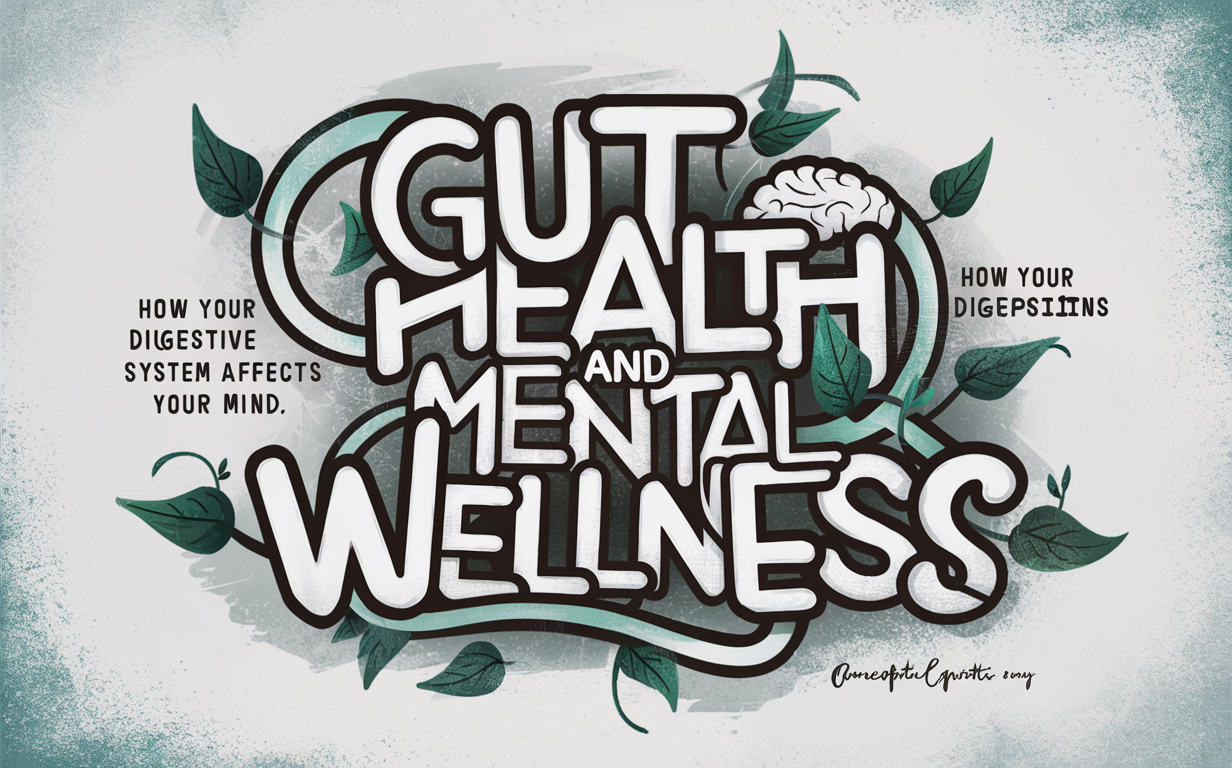Gut Health and Mental Wellness
Gut Health and Mental Wellness: The Surprising Link
Explore the profound science of the gut-brain axis and discover how nurturing your intricate inner ecosystem can dramatically impact your mood, stress levels, and cognitive clarity.
Key Takeaways
- The gut-brain axis is a constant, two-way communication network linking your digestive system and your central nervous system.
- Your gut microbiome produces the vast majority of neurotransmitters, including ~90% of serotonin, the “feel-good” chemical.
- Chronic gut inflammation (often from poor diet or stress) is directly linked to systemic inflammation, which can manifest as anxiety, depression, and brain fog.
- You can actively improve your mental wellness by nurturing your gut with a diet rich in fiber (prebiotics) and fermented foods (probiotics).
- Managing stress is crucial, as the stress hormone cortisol can negatively impact gut barrier integrity and microbial diversity.
Table of Contents
- The Gut-Brain Axis: A Two-Way Superhighway
- Meet Your Mental Health Allies: The Gut Microbiome
- The Chemical Messengers: How Gut Bacteria Talk to Your Brain
- Inflammation: The Fire That Connects Gut Distress to Mental Fog
- Actionable Strategies: Nurturing Your Gut for a Calmer Mind
- Your Questions Answered
- References & Further Reading
The Gut-Brain Axis: A Two-Way Superhighway
For centuries, we’ve spoken of “gut feelings,” “butterflies in the stomach,” and “gut-wrenching” decisions. These phrases are more than mere metaphors; they are intuitive acknowledgments of a profound biological reality: the gut-brain axis. This isn’t a single connection but a complex, bidirectional communication network that intimately links the emotional and cognitive centers of the brain with the functions of the digestive tract.
Imagine a bustling superhighway with traffic flowing constantly in both directions. The brain sends signals south, influencing gut motility, secretion of digestive juices, and local immune responses. This is why stress can immediately trigger digestive upset. Conversely, and perhaps more surprisingly, the gut sends a torrent of information north, profoundly influencing mood, behavior, and even our thought processes. The gut is no longer seen as a simple food-processing tube but as a “second brain” (or, more accurately, the enteric nervous system), with its own complex neural network that is in constant dialogue with the brain in your head.
Visualizing the Communication Flow
The gut and brain communicate via multiple channels, including the vagus nerve (the primary physical connection), the immune system (via cytokines), and the endocrine system (via hormones like cortisol), all of which are modulated by the gut microbiome.
The primary physical link in this axis is the vagus nerve, one of the longest nerves in the body. It acts as a fiber-optic cable, transmitting signals between the gut lining and the brainstem. But the conversation is far richer than just nerve impulses. The gut communicates through hormones, immune molecules (cytokines), and, most critically, through the metabolic byproducts of the trillions of microbes living within it.
Meet Your Mental Health Allies: The Gut Microbiome
Residing within your gut is an estimated 38 trillion microorganisms—a complex ecosystem known as the gut microbiome. This community of bacteria, viruses, and fungi outnumbers your own human cells. For a long time, their role was thought to be confined to digestion. We now understand that this inner world is a veritable chemical factory that plays a pivotal role in regulating our mental and emotional state.
A healthy, diverse microbiome is like a well-tended garden. Different species of bacteria perform different jobs, working in symbiosis to maintain balance. Some break down complex fibers that our bodies cannot, producing beneficial compounds called short-chain fatty acids (SCFAs) like butyrate, which fuels our colon cells and has anti-inflammatory properties. Others synthesize essential vitamins. And, critically for mental wellness, many of these microbes are responsible for producing and regulating the very neurotransmitters that govern our mood.
We are not just feeding ourselves; we are feeding the vast microbial community that lives within us. And in return, that community helps to shape who we are, how we feel, and how we think.
The Chemical Messengers: How Gut Bacteria Talk to Your Brain
The most direct way your gut influences your mind is through the production of neurotransmitters—the chemical messengers used by your nervous system to transmit signals between neurons. While we associate neurotransmitter production with the brain, the gut is a major player in this field.
The Serotonin Surprise
Serotonin is often called the “happy chemical” due to its crucial role in regulating mood, sleep, and appetite. Low levels are strongly linked to depression and anxiety. It’s therefore astonishing to learn that an estimated 90% of the body’s serotonin is produced not in the brain, but in specialized cells within the gut lining called enterochromaffin cells. The production in these cells is directly influenced by the bacteria present in the gut. Certain species of microbes can stimulate these cells to produce more serotonin, which can then act locally in the gut or enter the bloodstream to have wider effects.
Primary Site of Serotonin Production
- Gut (~90%)
- Brain (~10%)
Beyond Serotonin: GABA, Dopamine, and More
The gut’s neurochemical factory doesn’t stop at serotonin. Other key neurotransmitters are also produced or regulated by our gut microbes:
- GABA (Gamma-Aminobutyric Acid): This is the primary inhibitory neurotransmitter, responsible for producing a calming effect and reducing feelings of anxiety and fear. Strains like Lactobacillus and Bifidobacterium have been shown to produce GABA.
- Dopamine: A key neurotransmitter involved in motivation, reward, and focus. Certain species in the Bacillus genus can produce dopamine in the gut.
- Norepinephrine: Involved in the “fight or flight” response, alertness, and concentration. It, too, is produced by certain gut microbes.
While gut-produced neurotransmitters may not cross the blood-brain barrier directly, they influence the brain by stimulating the vagus nerve and influencing the production of these same chemicals within the brain itself.
Inflammation: The Fire That Connects Gut Distress to Mental Fog
Inflammation is the body’s natural response to injury or infection. However, chronic, low-grade inflammation is a destructive force linked to nearly every modern disease, including depression and anxiety. One of the primary drivers of this systemic inflammation begins in the gut.
The lining of your intestines is a remarkable barrier, only one cell thick, that is designed to absorb nutrients while keeping harmful substances—like undigested food particles, toxins, and pathogenic bacteria—out of your bloodstream. This is known as intestinal permeability. When the gut microbiome is out of balance (a state called dysbiosis), or when stressed, the tight junctions between these intestinal cells can loosen. This leads to a condition commonly known as “leaky gut.”
When the gut barrier is compromised, inflammatory substances can “leak” into the bloodstream, triggering a body-wide immune response. This systemic inflammation can cross the blood-brain barrier, leading to neuroinflammation. An inflamed brain is an unhappy and inefficient brain. Neuroinflammation is a key feature in clinical depression and is associated with symptoms like brain fog, low mood, fatigue, and an inability to concentrate.
Actionable Strategies: Nurturing Your Gut for a Calmer Mind
Understanding the gut-brain axis is empowering because it gives us a tangible, actionable target for improving mental wellness. By changing what we eat and how we live, we can directly cultivate a healthier inner garden and, in turn, a more resilient mind.
Prioritize Fiber (Prebiotics)
Prebiotics are the food for your good gut bacteria. They are indigestible fibers that travel to your colon, where microbes ferment them into beneficial short-chain fatty acids (SCFAs). Aim for a wide variety of plant-based foods like onions, garlic, leeks, asparagus, bananas, oats, apples, and legumes.
Incorporate Probiotics
Probiotics are live, beneficial bacteria that reinforce your native gut flora. Introduce fermented foods like live-culture yogurt, kefir, sauerkraut, kimchi, and kombucha. These deliver new, diverse microbes directly to your gut. Start small to allow your system to adjust.
Eat the Rainbow
Polyphenols, the compounds that give plants their vibrant colors, are powerful antioxidants and also act as prebiotics. A diet rich in different colored fruits and vegetables (berries, dark leafy greens, red cabbage) provides a diverse range of polyphenols to feed different types of beneficial bacteria.
Manage Stress Levels
Chronic stress releases cortisol, a hormone that can damage the gut lining and negatively alter the microbiome. Incorporate stress-reducing practices like mindfulness, meditation, deep breathing exercises, spending time in nature, or gentle yoga. These directly calm the gut-brain axis.
Optimize Your Sleep
Poor sleep quality and duration are linked to gut dysbiosis. Your gut microbiome has its own circadian rhythm. Aim for 7-9 hours of consistent, high-quality sleep per night to support both gut health and cognitive function.
Stay Hydrated
Water is essential for maintaining the mucosal lining of the intestines and for promoting the balance of good bacteria in the gut. Dehydration can lead to constipation and disrupt the normal function of your digestive system.
Your Questions Answered
While diet is not a replacement for professional medical treatment, a growing body of evidence shows it can be a powerful complementary therapy. By reducing inflammation and supporting the production of neurotransmitters, a gut-healthy diet can significantly improve mood regulation and resilience to stress. Many people report a noticeable reduction in anxiety symptoms and an improvement in mood and clarity after adopting a gut-focused eating pattern.
This varies greatly from person to person. Some individuals may notice subtle improvements in energy and mental clarity within a few weeks. More significant changes in mood and anxiety levels may take several months of consistent effort. The microbiome is dynamic but resilient; lasting change requires sustained new habits. Be patient and focus on consistent, long-term nurturing of your gut.
Fermented foods are generally preferred because they offer a wider diversity of microbial strains, along with fiber, vitamins, and beneficial metabolic byproducts from the fermentation process itself. Supplements can be useful for targeting specific conditions with high doses of particular strains, but they lack the synergistic nutritional matrix of whole foods. A food-first approach is usually best, with supplements considered as a targeted boost if needed.
If you have to pick just one thing, focus on increasing the diversity of plants in your diet. A landmark study (The American Gut Project) found that the number one predictor of a healthy gut microbiome was the number of different plant species a person ate each week. Aiming for 30+ different types of plants per week (including fruits, vegetables, grains, legumes, nuts, and seeds) is a fantastic goal that naturally increases your intake of fiber, prebiotics, and polyphenols.
References & Further Reading
This article synthesizes extensive research. For a deeper academic exploration, please consult these authoritative sources.
The Gut-Brain Axis: The Missing Link in Depression
Journal of Clinical Investigation, 2018
A comprehensive review detailing the mechanisms by which gut microbes and gut inflammation can influence the pathophysiology of major depressive disorder.
Microbiota-gut-brain axis: A new frontier in neuropsychiatry
Psychiatry and Clinical Neurosciences, 2021
Explores the therapeutic potential of modulating the gut microbiome (psychobiotics) for treating various psychiatric disorders, including anxiety and depression.
The role of short-chain fatty acids from gut microbiota in gut-brain communication
Nature Reviews Gastroenterology & Hepatology, 2020
A scientific review focusing on how short-chain fatty acids (SCFAs), produced by fiber fermentation, act as key signaling molecules in the gut-brain axis.
The Vagus Nerve as a Modulator of the Brain–Gut Axis in Psychiatric and Inflammatory Disorders
Frontiers in Psychiatry, 2018
This paper details the anatomy and function of the vagus nerve as the primary conduit for bidirectional communication between the gut and the brain.

